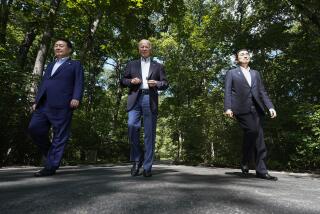President Is Upbeat on Summit : Sees Many Areas for Accord; Europe Missiles Stressed
- Share via
WASHINGTON — President Reagan, in one of his most optimistic statements about the outlook for next week’s summit with Soviet leader Mikhail S. Gorbachev, said Tuesday that there are “many areas for agreement” between the United States and the Soviet Union.
Although he was not specific about any agreements the summit might produce, the President suggested that progress could be made toward a nuclear-free zone in Europe. At the same time, he said, the issue of negotiations to eliminate medium-range missiles in Europe “is definitely one of the topics we will take up at the summit.”
Among the major U.S. goals at the Nov. 19-20 meeting are the elimination of suspicion and distrust between the two superpowers, as well as the signaling of progress to arms control negotiators in Geneva, Reagan declared in a pre-summit interview with five foreign broadcasters.
Separate Consideration
He also said that he would like arms negotiators at Geneva, who have been meeting with their Soviet counterparts since March, to consider the question of medium-range missiles separately from strategic weapons or defensive weapons. A similar suggestion was made by Gorbachev during a recent visit to Paris, but the Soviets never have officially submitted the proposal.
Reagan was asked if he could envision an understanding with Gorbachev on medium-range nuclear weapons and if he thought the two sides are closer to an agreement on that than on intercontinental ballistic missiles.
“Well, I know that the Soviets have talked about such things as a nuclear-free zone in Europe,” he replied. “And we’re willing to engage them, and will, in conversation on that kind of a subject.”
Meanwhile, one of Reagan’s arms control advisers, Paul H. Nitze, also guardedly optimistic, predicted in a separate interview Tuesday that Reagan and Gorbachev will reach agreement on some bilateral matters and perhaps even agree on a statement on the difficult issue of arms control.
Much More Hopeful
Although he expects no dramatic breakthrough, Nitze has continued to sound much more hopeful than other senior U.S. officials that substantial progress will be made in resolving U.S.-Soviet differences.
Nitze said he still holds out hope that the summit will produce a statement of guidelines on the Geneva arms talks that would at least move the negotiations forward. But other senior Administration officials have said that the Soviets’ insistence on a ban on so-called “Star Wars” research makes agreement on such a statement unlikely.
However, Reagan has been just as insistent that he will proceed with his space-based shield against nuclear weapons, officially known as the Strategic Defense Initiative, and he has offered to share information with the Soviets if the United States determines that it can develop the system.
But the Soviets have spurned that offer, and a senior Administration official said Tuesday that Moscow also is expected to reject a U.S. proposal for an “open laboratory” arrangement whereby both countries could check on each other’s research into missile defense systems.
“We have asked the Soviets to sit down and discuss these matters with us, beginning now,” said the official, who briefed reporters at the White House on condition he not be identified.
Nitze, whose interview with foreign journalists was beamed to Europe through U.S. Information Agency facilities, said that at the summit, it may be possible to make progress on approaches the superpowers will take toward multilateral arms control issues, such as U.N. negotiations in Geneva on chemical warfare.
Bilateral Issues
He said he expects the two sides to reach agreements on several longstanding bilateral issues, including perhaps air safety in the Pacific, the resumption of commercial air flights between the United States and the Soviet Union and an exchange of consulates.
With Reagan scheduled to leave for Geneva on Saturday, most of his activities this week are revolving around preparations for his first encounter with a Soviet counterpart.
The White House announced that Reagan, who has been going through extensive briefing sessions, will make a televised address to the nation Thursday (5 p.m. PST) outlining his approach to the summit and his hopes for improved U.S.-Soviet relations.
At a White House meeting Tuesday, he won strong bipartisan indications of support after telling congressional leaders of both parties that he is going to the summit in “a constructive and realistic spirit.”
Reagan, 74, also joked about being the first President who is older than the Soviets’ top leader. Reagan said he will tell Gorbachev, 20 years his junior, to “listen to his elders.”
Secretary of State George P. Shultz, who met with Gorbachev and other Soviet leaders in Moscow last week, told the congressional leaders at the White House that he expects “candid discussions” at the summit, according to White House spokesman Edward P. Djerejian. And after the session, Senate Majority Leader Bob Dole (R-Kan.) told reporters: “Everyone around expressed hope that (Reagan) would have a successful summit.”
Senate Minority Leader Robert C. Byrd (D-W.Va.), a member of a congressional delegation that visited Gorbachev in Moscow recently, said he told Reagan that although the Soviet leader will be a “formidable” opponent, he is “not really 10 feet tall, and in any match, Mr. Reagan would beat him hands down.”
More to Read
Get the L.A. Times Politics newsletter
Deeply reported insights into legislation, politics and policy from Sacramento, Washington and beyond. In your inbox twice per week.
You may occasionally receive promotional content from the Los Angeles Times.










